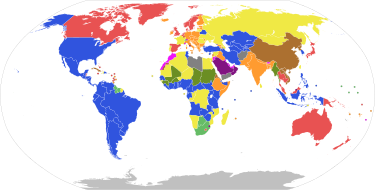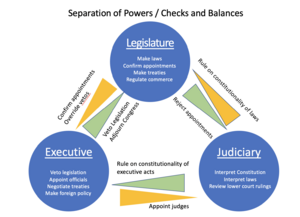Government facts for kids
 |
|||||
| Systems of government | |||||
|---|---|---|---|---|---|
|
A government is a group of people who have the power to lead a territory, like a country, a state, or a region. They do this by following the law.
Governments do many important things for the people they lead:
- They create laws, rules, and guidelines for everyone to follow.
- They collect taxes from people and businesses to pay for public services.
- They also print money for the country.
- Governments have a system of justice to decide what is against the law. They also set punishments for breaking laws.
- A police force helps make sure people follow the laws and stay safe.
- Diplomats are people who talk with leaders from other countries. They try to solve problems, make agreements, and share ideas. This can help prevent wars and improve trade.
- Governments have a military force, like an army. This force protects the country if others attack. It can also be used to attack or invade other countries.
- The leader of a government and their advisors are often called the administration.
Contents
How Governments Started
No one knows exactly when or where the first governments began. But about 5,000 years ago, small cities started to appear. These cities needed ways to organize themselves. Over time, some grew into larger areas with more complex governments, like ancient Sumer or ancient Egypt.
One big reason governments formed was agriculture. When people learned to farm, they could grow more food than they needed. This meant some people could do other jobs, like building, teaching, or even leading the community. As communities grew larger and closer together, they needed rules and leaders to help everyone get along and manage resources like water.
Understanding Government
The basic idea of government is simple: people who rule over other people and land. This can be a small group for a community. Or it can be a large government for a whole continent, like Australia or India.
Governments often decide who can own land. They use laws to give people this right. Some people believe they should be able to own land without government permission. This idea is called libertarianism. Others think people can live together peacefully without any government at all. This idea is called anarchism.
Almost every place on Earth has one government that claims control over it. Places without a government are rare. These might be small areas with border disputes, or places where people follow old traditions instead of government rules.
The word "sovereign" means having complete control. It comes from an old word meaning "control by a King". Today, it means a government has full power over its territory. Governments of villages, cities, and counties usually report to the government of their state or province. These state governments then report to the country's main government.
Modern governments and nation states grew out of the time of Kings and feudalism. For example, the capital of a country was often where the King kept his important things. This led to the modern idea of capital in economics. Governments also regulate trade between people and businesses.
There are many ideas about how to make governments better. These ideas are part of civics. Because people in government can sometimes be greedy, many believe that leaders should be elected. This way, if a government doesn't do a good job, people can choose new leaders in the next election. However, many countries still have governments where only a few people have power, not everyone.
Types of Governments
There are many different ways a country can be governed. Here are some common types:
What is a Democracy?

A democracy is a very common type of government, especially in Western countries. In a democracy, people in a country get to vote. They choose representatives or political parties they think will do the best job. These elected people then work in places like the Parliament or Congress.
Political parties are groups of people who share similar ideas. They have different plans for how the country should be run. A famous saying about democracy is: "government of the people, by the people, for the people." This means the people have the power.
Sometimes, even in democracies, there are limits on choices. For example, some parties might not be allowed to run. Or they might not get much time on TV or in the news. Sometimes, voting systems can be unfair. This can make it harder for people to truly choose their leaders.
What is a Monarchy?
A monarchy is a government led by a king or a queen. They usually get their position because they were born into the "royal family."
There are two main kinds of monarchies:
- In an absolute monarchy, the king or queen has total power. There are no limits on what they can do.
- In a constitutional monarchy, the ruler's power is limited. This means they must follow a special document called a constitution.
What is an Aristocracy?
An aristocracy is a government run by people considered the "best" or most skilled. A person who rules in this system is called an aristocrat.
Aristocracy is different from nobility. Nobility means one family line rules. In an aristocracy, a few or many families might rule. Or, rulers might be chosen in a different way, based on their abilities or qualities.
What is a Dictatorship?
Under a dictatorship, one person has all the power. This person is called a dictator. They have complete control over the people in the country.
Long ago, in the Roman Republic, dictators were sometimes chosen. They led during times of war, but only for a short time. Modern dictators are different. Their rule is not limited by laws, constitutions, or other groups.
After World War II, many countries in Latin America, Asia, and Africa had dictators. Some famous examples include Josef Stalin, Adolf Hitler, Idi Amin, and Muammar al-Qaddafi.
What is an Oligarchy?
An oligarchy is a government where a small group of powerful people rule. These people might share power equally, or some might have more power than others.
An oligarchy is different from a true democracy. In an oligarchy, only a few people have the chance to make big changes. This type of rule doesn't have to be passed down through families. There isn't one clear ruler, but several powerful people.
Past examples include the former Union of Soviet Socialist Republics and Apartheid South Africa. Some people even think that the United States acts like an oligarchy, even though it's a representative democracy.
Cool Facts about Government
- The word "government" comes from an old Greek word, "kybernan," which means "to steer" or "to pilot" – just like a captain steers a ship through the waters, a government helps steer a country!
- More than half of the nations in the world are democracies. As of 2021, 97 out of 167 countries were democracies.
- The study of how to run a government and prevent people from harming each other is called politics.
- Taxes are how most governments get money.
- Antarctica is mostly without a government because very few people live there.
- San Marino, a tiny country completely surrounded by Italy, is often considered the oldest surviving republic in the world! It was founded way back in 301 AD, which means it has been governing itself for over 1,700 years!
- Monarchy is one of the oldest forms of government in the world.
- The United Kingdom, Japan, and Sweden are examples of countries with constitutional monarchies, where a monarch serves as head of state, but a parliament and prime minister (elected officials) hold the real political power.
- The longest-reigning monarch in recorded history was King Sobhuza II of Swaziland (now Eswatini), who ruled for over 82 years!
Related pages
Images for kids
See also
 In Spanish: Gobierno para niños
In Spanish: Gobierno para niños


